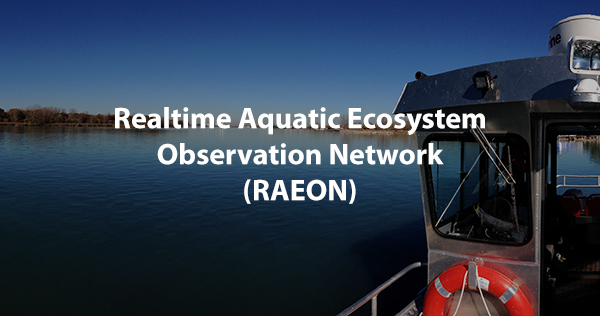Investigators

Principal investigator:
Aaron Fisk
Professor, CRC (Tier 1) and RAEON Science Director
School of the Environment
University of Windsor
Katelynn Johnson
Research and Operations Director
University of Windsor
Additional team members:
Marguerite Xenopoulos
Professor and CRC (Tier 1)
Biology
Trent University
Bryan Neff
Professor
Biology
The University of Western Ontario
Steve Cooke
Professor
Biology and Environmental Science
Carleton University
Irena Creed
Professor and Vice-Principal
Research and Innovation
University of Toronto Scarborough
Project description
The overall objective of the Real-Time Aquatic Ecosystem Observation Network (RAEON; raeon.org) is to collect real-time, continuous data at unprecedented temporal, spatial and organizational resolutions to address important unknowns and untested hypotheses about how freshwater ecosystems are structured and function. By realizing this, RAEON seeks to identify threats to lake ecosystem health and water security, contribute to sustainable fisheries, and inform improved freshwater ecosystem management, conservation and policy.
RAEON is a CFI-IF and Ontario Ministry of Colleges and Universities funded network that provides infrastructure, lab analysis, technical staff, and data management to Canadian academic researchers and their partners to carry out cutting-edge, integrated, and transformative research on the Great Lakes and freshwater ecosystems. This $15.9 million multi-institutional grant included five universities (Windsor, Trent, Carleton, Western Ontario, and Saskatchewan; now includes the Toronto- Scarborough) but has provided equipment to researchers from other universities in Ontario to support research and grant proposals. REAON has also been supported by funds from US partners to support technical staff and operational costs, including the Great Lakes Observatory System (GLOS; NOAA-funded IOS), Great Lakes Acoustic Telemetry Observation System (GLATOS) and the Great Lakes Fishery Commission (GLFC). RAEON is also a partner, through the University of Windsor, with the Cooperative Institute for Great Lakes Research (CIGLR) supported by the NOAA-Great Lakes Environmental Research (GLERL) at the University of Michigan, which provides access to NOAA funds, technical expertise, and logistic support (e.g., research vessels). RAEON is growing by i) expanding the network of researchers using its instruments, technical expertise, and data management system; ii) securing regional, national, and international funding to expand infrastructure and staff; iii) contributing to grant proposals in Canada and internationally; and iv) working with industry and government to develop new technology and expand observational networks in Canadian freshwater ecosystems. This effort is contributing to keeping Canada at the forefront of aquatic research and technology development, allowing us to be a global leader in the conservation of freshwater ecosystems.
Despite the challenges and limitations of a global pandemic, RAEON, which became operational in 2019, has and continues to support funded research and HQP that are untangling the mechanisms and processes that underpin freshwater ecosystems, improving management and conservation, and securing ecosystem services. For example, REAON supported a $9 million national network on fish genomics that is assessing freshwater ecosystems across Canada to 2 conserve biodiversity (gen-fish.ca). REAON also provided real-time instruments to a $1 million NSERC Alliance project that generates real-time and continuous data on lake conditions and chemistry to identify threats to the production of potable water for people, agriculture, and industry. For a list of the projects supported by RAEON, please see https://raeon.org/category/projects/.
The largest component of RAEON are the deployable instruments that are available to Canadian academic researchers and partners for a minimum rental fee (see raeon.org/raeon-equipment-sharing/ for details and costs). These in situ instruments measure a wide range of freshwater chemical (O2, CO2, NO3, P species), biological (CDOM, chlorophyll, phycocanins, HAB communities, hydroacoustics, acoustically tagged fish, eDNA) and hydrological (wave heights, water levels, surface and subsurface currents) parameters. All instruments provide continuous sampling and data collection, many are real-time via cellular and satellite networks, and Slocum gliders provide autonomous collection of data across space (1,000 kms) and time (days to months).
RAEON has also provide new instruments to laboratories studying freshwater ecosystems at our partner universities (see participating labs at raeon.org/labs – under construction). These labs provide a range of services, including stable isotope analysis of bulk and compound specific chemicals, water nutrients, water anions/cations, particle analysis, fish respiration, genetic, genomic and transcriptomics. By bringing these labs under the RAEON umbrella we can coordinate methodologies and QA/QC and offer cost savings to our partners.
The lead PI and current Science Director of RAEON is Aaron Fisk, a professor and Tier 1 CRC in Changing Great Lakes Ecosystems at the University Windsor. Katelynn Johnson is the Research and Operations Director of RAEON, overseeing the operation, budget, and data management of the network. RAEON is governed by the Science Advisory Committee, represented by leading researchers at each partner universities and one scientist from a Canadian and US government agency. REAON has three fulltime and three parttime technicians, spread across the partner universities. Details on these people, and other researchers utilizing RAEON can be found at https://raeon.org/people-partners/.
